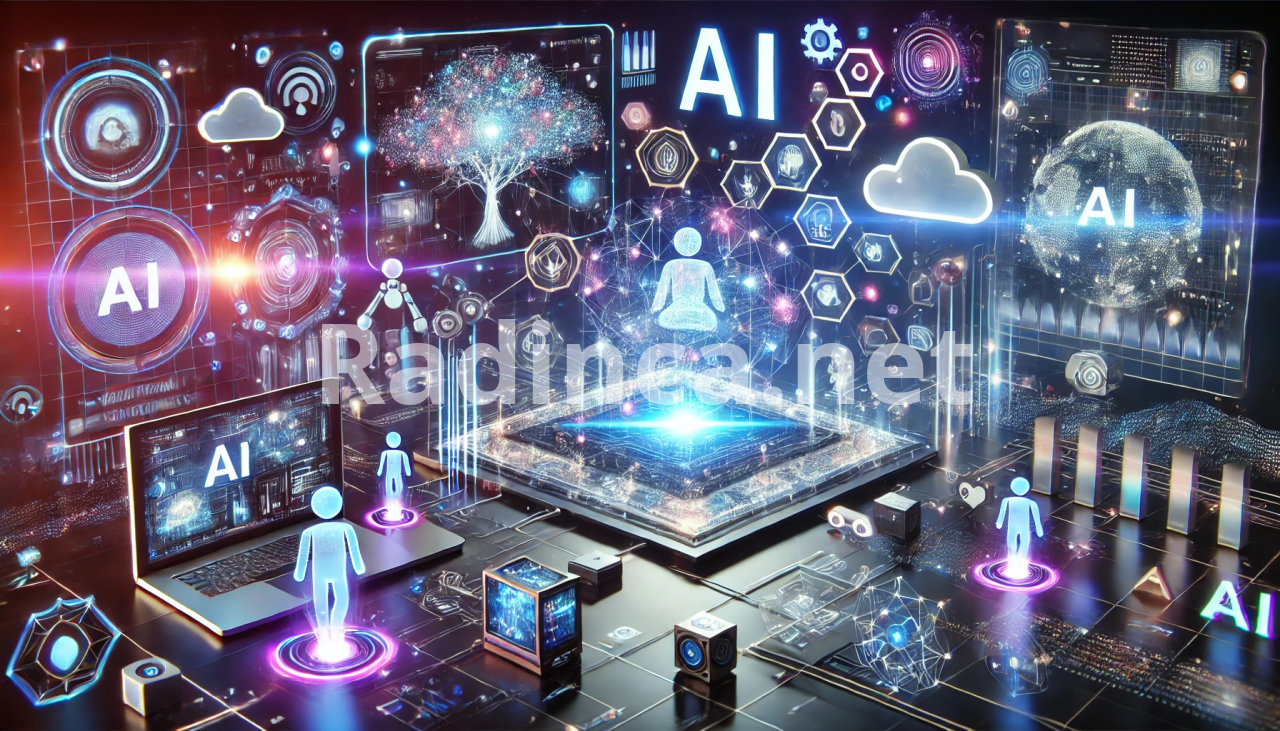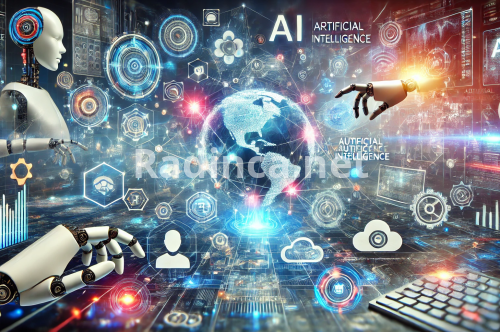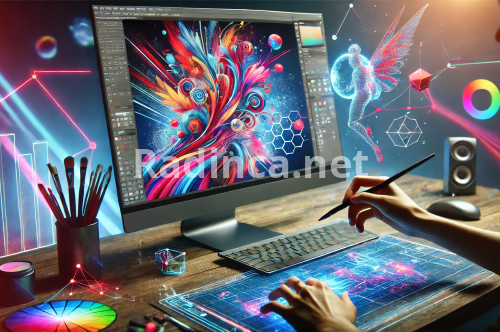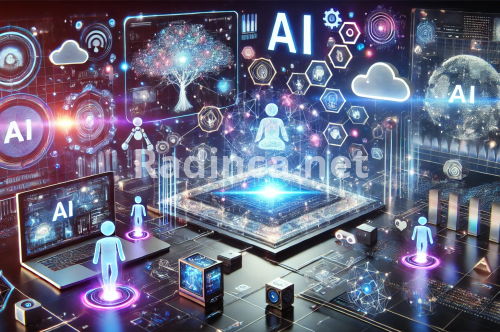Understanding Artificial Intelligence – Its Impact and Future in 2025.

Artificial Intelligence (AI) isn’t just a buzzword anymore; it’s a part of your daily life, whether you realize it or not. Think about the tools and systems you use every day—your smartphone, voice assistants like Alexa or Siri, or the recommendations Netflix and Amazon provide for you. All of these are powered by AI, working quietly behind the scenes to simplify your life, save you time, and even make decisions on your behalf. AI has rapidly evolved from being a futuristic concept to becoming the invisible force driving innovation, improving efficiency, and reshaping industries worldwide.
Now, you might be wondering: What does this really mean for you? How is AI transforming the world you live and work in? How will it impact the businesses you interact with, the job market, and even the way you learn and grow? As exciting as AI’s capabilities are, its rapid adoption raises important questions: Will it help or hurt your career? Can it solve global challenges, or will it amplify existing inequalities? Will it improve your quality of life, or will it create more ethical dilemmas to solve?
To truly understand AI, you first need to break down what it is and how it works. AI essentially mimics human intelligence to solve problems, make decisions, and learn from experience. If you’ve ever used Google Maps, you’ve already experienced AI helping you find the fastest route to your destination. Behind the scenes, AI analyzes countless data points—traffic congestion, weather, and real-time updates—to optimize your path. Similarly, machine learning (a key aspect of AI) helps systems adapt and improve over time, enabling tools like predictive text to learn your typing style or chatbots to answer your questions with increasing accuracy.
You’re already benefiting from AI in healthcare, education, and transportation. AI is helping doctors diagnose diseases earlier, personalize learning experiences for students, and even power self-driving cars that could revolutionize the way you commute. Businesses are using AI to create tailored experiences for you, predicting what you might need before you even ask. Whether it’s AI-generated product recommendations or automated customer support, the technology is designed to make your life easier.
But AI’s rapid evolution also comes with challenges that affect you directly. Job automation is replacing some traditional roles, and that may require you to learn new skills to stay relevant. AI systems are only as good as the data they are trained on, which means they can sometimes reflect human biases—something that could affect hiring practices, credit approvals, or even legal decisions. As AI continues to expand its reach, issues like privacy, ethics, and fairness become questions you can’t afford to ignore.
In this article, we’ll take a deep dive into the world of AI, showing you exactly how it’s transforming industries, reshaping your personal experiences, and opening doors to the future. You’ll learn about AI’s benefits, its limitations, and what the future holds as AI continues to integrate into your life. By the end, you’ll see how AI isn’t just a tool for businesses or tech enthusiasts—it’s something that has the power to change the way you live, work, and interact with the world around you.
The Role of Artificial Intelligence in Modern Industries
AI has transformed key industries by increasing efficiency, enabling automation, and driving innovation. Here’s a closer look at its impact:
1. Healthcare
AI plays a crucial role in improving patient care and diagnostics.
- Medical Imaging: AI systems analyze X-rays, CT scans, and MRIs to detect diseases such as cancer early.
- Predictive Analytics: Machine learning predicts patient risks by analyzing medical histories and genetic data.
- AI-Powered Drug Discovery: Reduces research time, speeding up the creation of new medicines.
For example, IBM Watson uses AI to analyze large amounts of medical literature to assist doctors with accurate diagnoses.
2. Business and Finance
AI enhances productivity, reduces costs, and improves decision-making in businesses.
- Customer Service: AI chatbots and virtual assistants automate responses, providing 24/7 support.
- Fraud Detection: AI algorithms in banking systems analyze transactions to identify anomalies and prevent fraud.
- Predictive Analytics: Businesses use AI to predict sales trends, manage inventory, and optimize supply chains.
AI-powered tools like Salesforce Einstein help businesses improve marketing strategies by analyzing customer behavior.
3. Manufacturing
AI-driven automation and robotics revolutionize production processes.
- Robotic Process Automation (RPA): Increases production efficiency and reduces human error.
- Predictive Maintenance: AI predicts when machines need maintenance, minimizing downtime.
- Quality Control: AI identifies defects in production lines through visual inspection systems.
Companies like Tesla use AI-driven robotics for precision assembly in manufacturing electric vehicles.
4. Transportation
AI is revolutionizing the transportation sector, most notably through autonomous vehicles.
- Self-Driving Cars: AI systems use sensors, cameras, and algorithms to navigate and make real-time driving decisions.
- Traffic Management: AI analyzes traffic data to optimize routes and reduce congestion.
- Logistics: AI-powered solutions improve delivery routes and supply chain management for e-commerce.
Companies like Waymo and Tesla are leading the charge toward fully autonomous driving systems.
5. Education
AI personalizes learning experiences and enhances educational outcomes.
- Smart Tutors: AI identifies students’ strengths and weaknesses to create tailored learning plans.
- Automated Grading: AI tools save time by automating grading of tests and assignments.
- Virtual Classrooms: AI enables interactive online learning platforms, improving accessibility.
Tools like Duolingo use AI to provide adaptive language learning experiences for millions of users worldwide.
Benefits of Artificial Intelligence
AI offers transformative benefits that improve efficiency, accuracy, and productivity across industries:
- Automation: AI automates repetitive tasks, freeing up human resources for higher-level work.
- Cost Savings: Businesses reduce operational costs through AI-powered solutions.
- Data Analysis: AI processes and analyzes vast datasets, providing actionable insights.
- Improved Decision-Making: AI-driven analytics allow organizations to make informed, data-backed decisions.
- Innovation: AI fosters innovation by enabling advancements in robotics, medicine, and renewable energy.
Challenges of AI Adoption
Despite its benefits, AI presents significant challenges that society and businesses must address:
- Job Displacement
AI automation replaces tasks traditionally performed by humans. Industries like manufacturing, customer service, and transportation face significant disruption. Upskilling workers to adapt to AI-driven roles becomes essential. - Bias in AI Systems
AI systems inherit biases from their training data, leading to unfair outcomes. For instance, biased hiring algorithms or facial recognition systems can reinforce societal inequalities. - Data Privacy
AI relies heavily on data collection, raising concerns about privacy and security. How companies handle user data and ensure transparency remains a key issue. - Ethical Concerns
AI systems raise ethical questions about accountability and misuse. For instance, autonomous vehicles must decide how to respond in life-threatening scenarios, raising moral dilemmas. - Lack of Human Touch
While AI excels at automation, it cannot replicate human qualities like empathy, creativity, or nuanced judgment. Overreliance on AI risks depersonalizing human interactions.
The Future of Artificial Intelligence
AI’s future promises further advancements and opportunities across sectors:
- General AI: Moving beyond task-specific AI toward systems capable of general intelligence, like human reasoning.
- AI in Healthcare: AI will continue to revolutionize medicine with real-time disease prevention, robot-assisted surgeries, and personalized treatments.
- Sustainable AI: AI solutions will play a critical role in addressing climate change, optimizing energy usage, and managing environmental resources.
- Human-AI Collaboration: The future lies in humans collaborating with AI, enhancing creativity, productivity, and decision-making processes.
Emerging technologies like quantum computing will amplify AI’s processing power, leading to breakthroughs in data analysis and problem-solving.
Conclusion
So, where does that leave you in a world that is rapidly being transformed by artificial intelligence? AI is no longer a far-off, futuristic dream—it’s here, and it’s impacting almost every aspect of your life. Whether you’re using it to streamline your daily tasks, make smarter decisions, or enjoy personalized experiences, AI has already become your silent partner in efficiency.
For your career, AI presents both challenges and opportunities. It’s true that automation could take over repetitive tasks, but that also gives you the chance to focus on the things machines can’t replicate: creativity, critical thinking, and emotional intelligence. If you embrace AI as a tool rather than a threat, you’ll find that it can enhance your skills, improve your productivity, and help you stay ahead in your field. Whether you’re in healthcare, business, education, or even creative industries, AI can amplify what you do—if you’re willing to adapt and learn.
But AI doesn’t just affect how you work; it also influences the kind of world you live in. Imagine a future where diseases are detected long before symptoms appear, personalized learning plans help you or your children achieve their full potential, and self-driving cars make commuting safer and more efficient. Imagine businesses anticipating your needs before you even realize them, saving you time and money. These are just a few of the ways AI could enhance your life in the years to come.
However, the benefits of AI come with responsibilities you can’t ignore. For AI to truly work in your favor, it must be fair, transparent, and accountable. It’s important to question how companies are using your data, what biases might exist in AI algorithms, and how the decisions they make affect you and others. You also play a role in shaping the ethical use of AI—by staying informed, advocating for fairness, and supporting regulations that protect privacy and equality.
Ultimately, AI isn’t here to replace you—it’s here to empower you. The future of AI is about collaboration, not competition. You bring creativity, emotional intelligence, and ethical judgment to the table, while AI handles the heavy lifting, processes complex data, and uncovers insights you may have overlooked. Together, you and AI have the potential to solve problems that seemed impossible just a few decades ago: combating climate change, improving access to healthcare, and building smarter, more sustainable cities.
So, what can you do today to prepare for this AI-driven future? Start by learning about AI and exploring the tools that can make your work and life easier. Invest in skills that complement AI, like critical thinking, problem-solving, and creativity. Stay curious and adaptable, because the more you embrace AI as an ally, the more opportunities it will unlock for you.
The future isn’t about AI replacing humanity—it’s about AI and humanity working together. When you harness the power of AI responsibly, you can unlock its full potential to create a smarter, more connected, and more innovative world. You have a choice: You can fear AI’s changes, or you can take control and use it to build the future you want to see.
Artificial intelligence is here to stay, and it’s reshaping the way you live, work, and connect. The question now is: How will you choose to embrace its possibilities? Whether you’re a business leader, a student, a professional, or simply someone looking to improve your daily life, AI holds the keys to progress. By stepping into the future with an open mind and a willingness to adapt, you can ensure that AI works for you, not against you. The power of AI is in your hands—so let’s make the future together.
 English
English Spanish
Spanish


